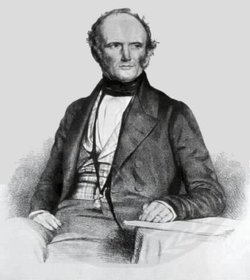Charles Lyell
|
|
Sir Charles Lyell (November 14, 1797 – February 22, 1875), British lawyer, geologist, and popularizer of uniformitarianism.
Charles Lyell was born in Kinnordy, Forfarshire, Scotland, the eldest of ten children. Lyell's father, also named Charles, was a botanist of minor repute and first exposed the younger Charles to the study of nature. Having attended Exeter College, Oxford ending in 1816, Lyell encountered geology as a serious profession under the wing of William Buckland. Upon graduation he took a professional detour into the law, but dabbled in geology. His first paper, "On a Recent Formation of Freshwater Limestone in Forfarshire", was presented in 1822. By 1827 he had abandoned the law and embarked on a long geological career that would result in the widespread acceptance of the ideas proposed by James Hutton a few decades before.
His most important specific work was in the field of stratigraphy. In 1828, he travelled to the south of France and to Italy, where he realised that the recent strata could be categorised according to the number and proportion of marine shells encased within. Based on this he proposed dividing the Tertiary period into three parts, which he named the Pliocene, Miocene, and Eocene.
From 1830 to 1833 his multi-volume Principles of Geology was published. The work's subtitle was "An Attempt to Explain the Former Changes of the Earth's Surface by Reference to Causes now in Operation", and this explains Lyell's impact on science. He was, along with the earlier John Playfair, the major advocate of the then-controversial idea of uniformitarianism, that the earth was shaped entirely by slow-moving forces acting over a very long period of time. This was in contrast to catastrophism, a geologic idea that went hand-in-hand with age of the earth as implied by biblical chronology. In various revised editions (twelve in all, through 1872), Principles of Geology was the most influential geological work in the middle of the 19th century, and did much to put geology on a modern footing. For his efforts he was knighted in 1848, then made a baronet in 1864.
During the 1840s, he travelled to the United States and Canada, which resulted in his writing two popular travel-and-geology books: 1845's Travels in North America and A Second Visit to the United States (from 1849).
Charles Darwin was a close personal friend, and Lyell was one of the first prominent scientists to support The Origin of Species — though he never fully accepted natural selection as the driving engine behind evolution. In fact, Lyell was instrumental in arranging the peaceful co-publication of the theory of natural selection by Darwin and Alfred Russel Wallace in 1858, after each discovered it independently. Lyell's own The Geological Evidence of the Antiquity of Man followed a few years later in 1863.
He won the Copley Medal in 1858 and the Wollaston Medal in 1866.
Upon his death in 1875, he was buried in Westminster Abbey.
Craters on Mars and the Moon were named in his honour.de:Charles Lyell fr:Charles Lyell

